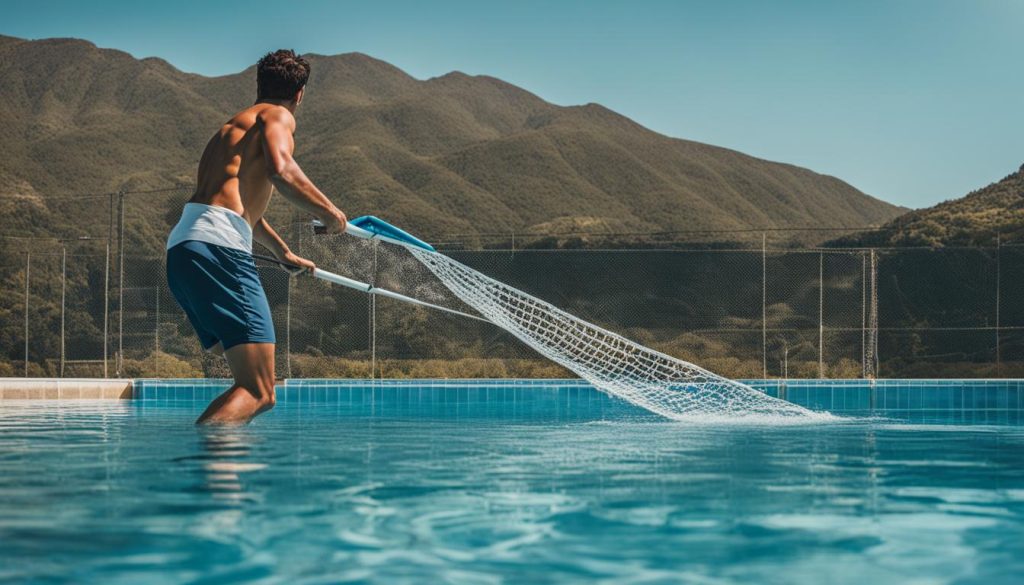Welcome to our easy-to-follow guide on DIY pool maintenance. Keeping your pool clean and sparkling doesn’t have to be a daunting task. With our basic tips and tricks, you can maintain your pool’s cleanliness and functionality without breaking the bank.
Regular maintenance is crucial to ensure a safe and healthy swimming environment and to prevent costly repairs. In this section, we will discuss the essential steps you need to follow to keep your pool in top condition.
Whether you’re a new pool owner or an experienced one, our guide will provide you with the knowledge necessary to maintain a crystal-clear pool. So, let’s dive in and learn some essential DIY pool maintenance tips and tricks to keep your pool in top shape all summer long.
Importance of Regular Pool Maintenance
Here at our company, we understand that owning a pool can be a significant investment. Therefore, it’s important to maintain your pool regularly to keep it in top condition for years to come. By neglecting your pool, you may experience a plethora of issues, such as debris buildup, algae growth, and equipment failure. Regular pool maintenance not only helps keep your pool clean and safe for swimming but also prevents costly repairs.
Why Regular Pool Maintenance Matters
Regular pool maintenance is essential for your pool’s longevity. Neglected pools can be breeding grounds for harmful bacteria, which can lead to skin irritations, ear infections, and other health issues. By maintaining proper water chemistry and sanitation, you can avoid these problems and ensure your family and guests have a safe and enjoyable swimming experience.
Additionally, regular pool maintenance can prevent equipment failure. A pool’s pump and filter are critical components for maintaining clean water, and they require regular maintenance to operate efficiently. Neglecting to clean or replace these components can lead to costly repairs and even more significant issues.
Proactive Measures to Take
By taking proactive measures and maintaining your pool regularly, you can minimize the need for costly repairs. At our company, we recommend scheduling regular maintenance checks to ensure your pool is in top condition. This includes checking the pool’s chemistry, skimming and cleaning the pool, and inspecting the equipment for any issues.
Regular pool maintenance not only ensures a clean and safe swimming environment but also prolongs the life of your pool and its components. By investing time and effort in maintaining your pool, you’re ultimately saving yourself money in the long run.
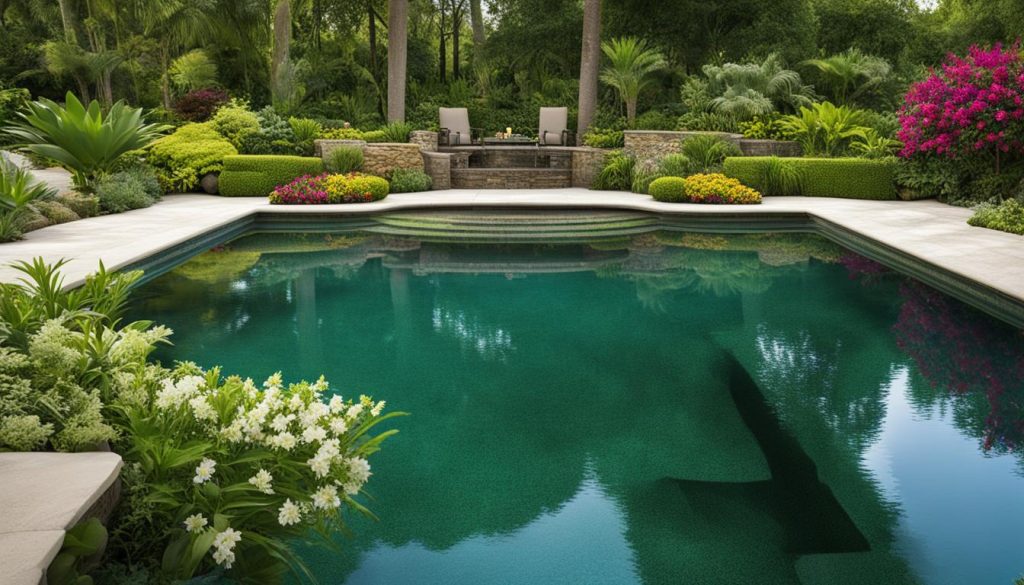
Conclusion
In conclusion, regular pool maintenance plays a crucial role in keeping your pool clean, safe, and functional. So, if you’re a pool owner, make sure to take the necessary steps to maintain your pool regularly. From skimming and cleaning your pool to maintaining the equipment and balancing the pool chemicals, every step is essential to keep your pool in top condition.
Cleaning and Skimming
Keeping your pool clean is an essential part of DIY pool maintenance. Nobody wants to swim in dirty or cloudy water, and regular cleaning and skimming will help keep your pool water crystal clear.
First, remove any large debris from the water’s surface with a skimmer net. This net is a long-handled tool with a mesh net at the end, which makes it easy to remove any leaves, twigs, or insects. Remember to skim your pool a few times a week if you have trees or bushes nearby.
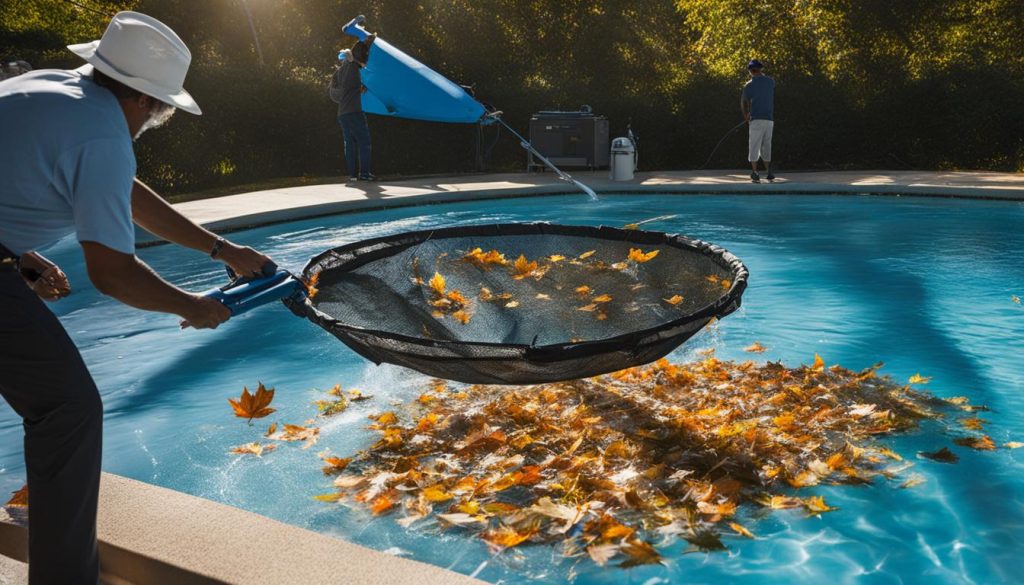
Next, brush the walls and floor of the pool to remove any algae or dirt buildup. Use a pool brush with stiff bristles to scrub the sides and bottom of your pool. If your pool has stubborn stains or build-up, use a specialized pool cleaner to deep clean and remove algae and bacteria.
Lastly, clean out your pool’s pump and filter basket regularly to prevent any blockages that could cause your pool to become cloudy or even stagnant. A good rule of thumb is to clean your pool’s filter at least once a week.
By following these simple cleaning and skimming steps, you can ensure that your pool stays beautiful and clean all summer long.
Balancing Pool Chemistry
One of the most important aspects of DIY pool maintenance is ensuring the correct chemical balance in your pool water. A balanced pool helps prevent the growth of harmful bacteria and algae, while also protecting your pool equipment from damage caused by corrosive water.
There are three key chemicals that you need to consider when balancing your pool’s chemistry: pH, alkalinity, and chlorine.
Testing Your Pool Water
Before you can balance your pool’s chemistry, you need to test your pool water. You can purchase pool testing kits from your local pool supply store or use digital testing equipment for accurate results.
To test the pH level of your pool, use a pool testing kit to measure the acidity of your water on a scale of 0 to 14. The ideal pH for a pool is between 7.2 and 7.8.
Next, test the alkalinity level of your pool water. Alkalinity acts as a buffer to prevent rapid changes in your pool’s pH levels. The recommended alkalinity level is between 80 and 120 parts per million (ppm).
Finally, check the chlorine levels in your pool. Chlorine is essential for killing harmful bacteria and algae. Ideally, your pool’s chlorine level should be between 1 and 3 ppm.
Adjusting Chemical Levels
If your pH or alkalinity levels are too low, you can add a pH increaser such as sodium carbonate. If your levels are too high, you can add a pH decreaser such as muriatic acid.
To increase your pool’s alkalinity, add sodium bicarbonate. To decrease alkalinity, you can dilute your pool water with fresh water.
If your chlorine levels are too low, add more chlorine to your pool. Sodium hypochlorite and calcium hypochlorite are both effective at raising chlorine levels. Be careful not to add too much chlorine as this can damage your pool equipment and harm swimmers.
Always follow the manufacturer’s instructions when adding chemicals to your pool to avoid over or under-dosing.
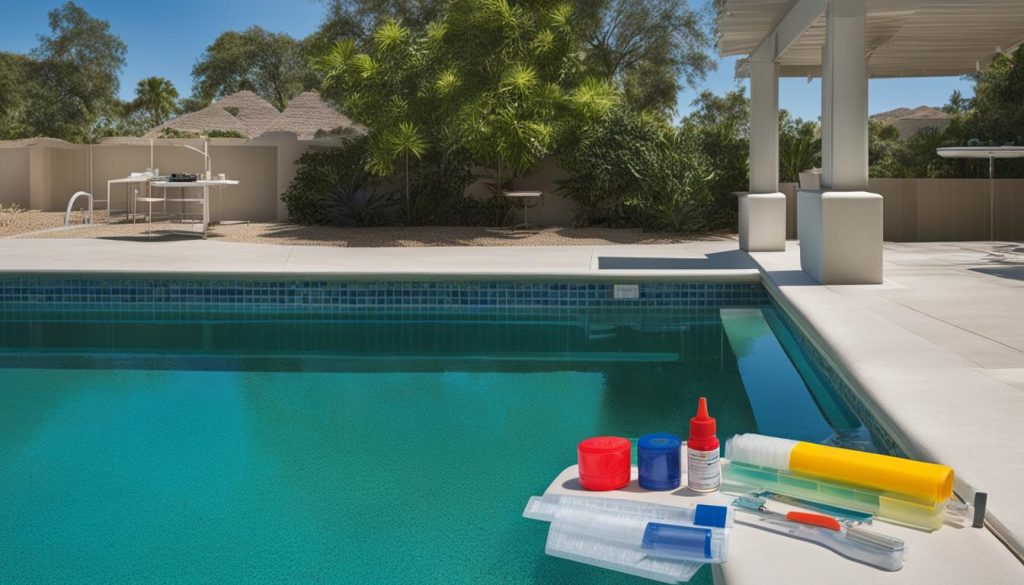
Equipment Maintenance
As we know, proper maintenance of your pool equipment is essential for keeping your pool in top shape. Regular inspections and cleanings can prevent untimely breakdowns and even save you money in the long run. Let’s take a look at some equipment care basics.
Filters
Your pool’s filter is responsible for removing dirt and debris from your pool water and keeping it clean. It’s important to clean or replace your filters regularly, especially during the swimming season when your pool is in use more frequently. Backwashing your filter every few weeks, or as needed, will help keep your pool clean and the filter working as efficiently as possible.
If you have a sand filter, you should change the sand every three to five years. For a cartridge filter, you should replace the cartridge every one to three years, depending on usage and the quality of the filters you use.
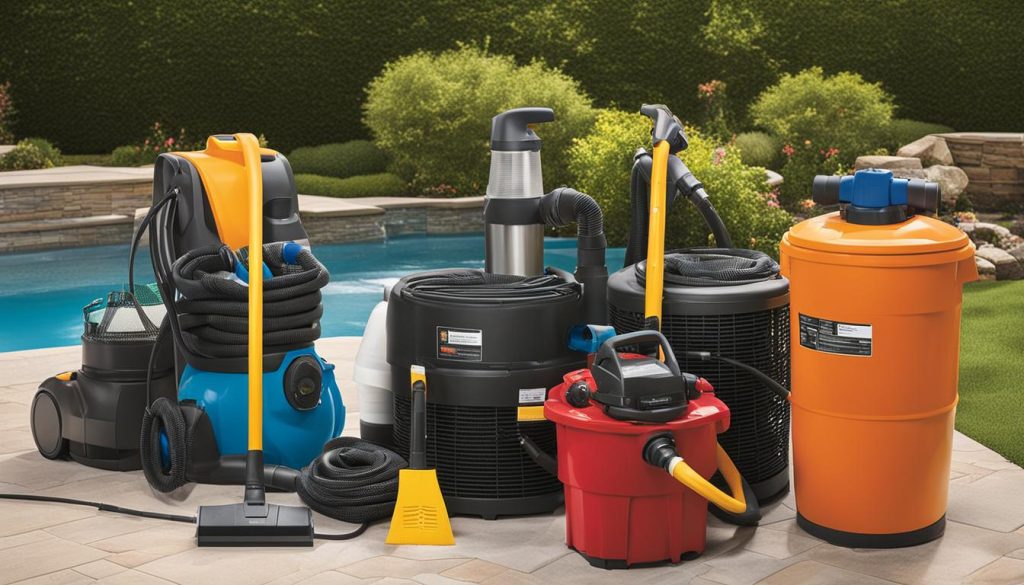
Pumps and Heaters
Your pool’s pump keeps the water circulating through the filter, keeping it clean. Regularly inspecting the pump and cleaning the strainer basket can prevent clogs and keep the pump running smoothly. If you notice any issues with your pump, such as unusual sounds or a drop in performance, contact a professional for repairs.
If you have a pool heater, make sure to regularly inspect your unit for any issues or leaks. Scheduling a professional maintenance check-up at the beginning of each season can help ensure your heater is working safely and efficiently.
Chlorinators and Salt Chlorine Generators
Chlorinators and salt chlorine generators are responsible for maintaining adequate levels of chlorine in your pool. It’s important to regularly inspect these components and clean them as necessary. If you have a salt chlorine generator, you should also check the salt levels in your pool regularly to ensure the generator is producing enough chlorine.
By following these simple maintenance tips, you can extend the lifespan of your pool equipment and help prevent costly repairs. Don’t forget to schedule regular professional maintenance checks to keep your pool in optimal condition.
Water Circulation and Filtration
Proper water circulation and filtration are crucial for maintaining clean and clear pool water. A well-functioning filtration system is essential because it removes the dirt, debris, and other contaminants from the pool water, making it safe and enjoyable to swim in. Here are some tips to help you ensure proper water circulation and filtration:
Test the Water Flow
One of the best ways to check if your water is flowing properly is by using the “bucket test.” Fill a bucket with water and place it on the second step of your pool. Mark the water level both inside and outside of the bucket. Let the bucket float for 24 hours without operating the pool equipment. After 24 hours, compare the water levels inside and outside of the bucket. If the water levels are the same, your water flow is good. If they are different, you may have an issue with your water circulation or filtration system.
Clean the Skimmer Basket and Pump Strainer Basket Regularly
The skimmer basket and pump strainer basket collect debris from the pool before it can reach the filtration system. It is essential to clean these baskets regularly to avoid clogging or damage to your equipment. A good rule of thumb is to clean them out every time you vacuum your pool.
Backwash and Clean the Filter
Filters catch dirt and debris to keep the pool water clean. Over time, however, these filters can become clogged and lose their effectiveness. Backwashing the filter is a process of reversing the flow of water through the filter to clean it and remove the trapped debris. It is recommended to backwash your filter every four to six weeks. Additionally, you should clean your filter at least once a year using a chemical filter cleaner to remove any built-up deposits.
By following these tips, you can ensure proper water circulation and filtration and keep your pool sparkling clean and safe to swim in.
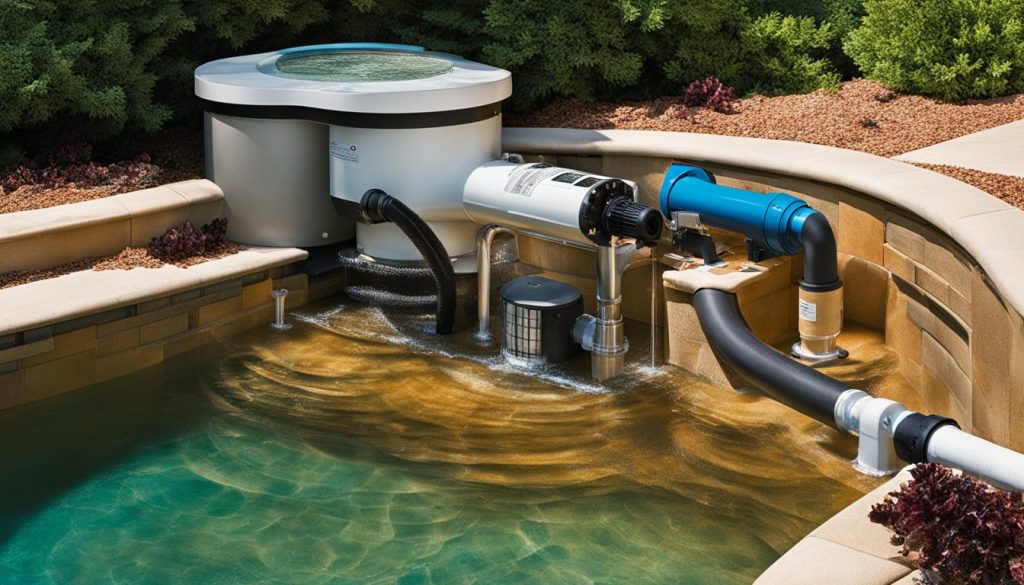
Seasonal Pool Maintenance
As the swimming season comes to an end, it’s essential to prepare your pool for colder months. Proper winterization can prevent damage to your pool and equipment, saving you time and money in the long run. Here’s what you need to do for seasonal pool maintenance:
Balance the Chemicals
Before closing your pool, it’s crucial to balance the chemicals properly. Adjust your pool’s pH levels between 7.2 and 7.8 and alkalinity between 80 and 120 ppm. Shock the pool with a chlorine shock treatment and add winterizing chemicals to prevent algae growth and bacterial buildup. Let the chemicals circulate for 48 hours before continuing the process.
Clean and Store Pool Accessories
Remove all pool accessories such as ladders, diving boards, and slides. Scrub and clean them thoroughly. Dry them and store them in a dry area to prevent rust and damage. Drain all water from the pump, filter, and heating equipment to prevent the water from freezing and damaging the equipment.
Lower the Water Level
Lower the water level in your pool to below the skimmer level. Use a submersible pump or a garden hose to remove any excess water from the pool. Lowering the water level is crucial to prevent water from freezing and expanding, which can damage the pool’s structure and equipment.
Cover Your Pool
Install a pool cover to protect your pool during the winter months. Make sure the cover is clean and free of debris before installation. Secure the cover using water tubes, cover clips, or other securing systems. A pool cover can prevent leaves, debris, and snow from accumulating in your pool, making the opening process much more manageable when the warmer weather returns.
By following these essential winterizing tips, you can protect your pool and equipment, making for an easy opening in the spring. Remember, a little effort goes a long way when it comes to seasonal pool maintenance.
Our support team is available at all times to ensure that none of your questions go unanswered. If you have any questions, please call us at (647) 891-0462.
FAQ
What are some basic tips and tricks for DIY pool maintenance?
DIY pool maintenance can be made easier with a few helpful tips and tricks. Some basic recommendations include regularly skimming the surface to remove debris, keeping the pool balanced with the right chemicals, and regularly cleaning and maintaining your pool equipment.
Why is regular pool maintenance important?
Regular pool maintenance is essential to ensure a clean and healthy swimming environment. By regularly maintaining your pool, you can prevent costly repairs, prolong the lifespan of your pool, and ensure optimal water quality and safety.
How do I clean and skim my pool effectively?
Proper cleaning and skimming are crucial for maintaining a clean pool. To clean effectively, use a pool net or skimmer to remove leaves, insects, and other debris from the surface of the water. Regularly brushing the walls and floor of the pool and vacuuming the pool can also help eliminate dirt and algae buildup.
How do I balance the chemistry of my pool?
Balancing the chemistry of your pool is essential for optimal water quality. Regularly test and adjust the pH levels, alkalinity, and chlorine levels of your pool. Using pool testing kits and following the recommended chemical ratios can help you maintain the right balance and ensure a safe and enjoyable swimming experience.
Why is it important to maintain pool equipment?
Regularly maintaining your pool equipment, such as filters, pumps, and heaters, is crucial for ensuring the proper functioning of your pool. By keeping your equipment clean and well-maintained, you can avoid costly breakdowns and ensure efficient water circulation and filtration.
How can I ensure proper water circulation and filtration in my pool?
Proper water circulation and filtration are vital for maintaining clean and clear pool water. Ensure that your pool’s filtration system is clean and well-maintained. Regularly clean or replace the filters to optimize their performance. Additionally, running the pool pump for an adequate amount of time each day can help ensure proper water circulation.
What should I know about seasonal pool maintenance?
Seasonal pool maintenance is crucial for protecting your pool during the off-season and preparing it for the next swimming season. When winterizing your pool, ensure that the water is properly balanced and the equipment is clean and winter-ready. In the summer, reopen your pool by cleaning and maintaining the equipment, balancing the water chemistry, and ensuring proper water circulation.

